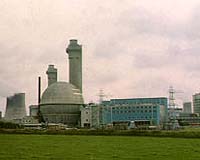 |
Washington (AFP) Nov 15, 2009 With crucial global climate talks less than a month away, US senators appear to be betting on nuclear energy as the key to finally passing sweeping domestic climate change legislation. After shrugging off a boycott by Republicans who opposed the measure and mostly shunned the debate, Democrats pushed the legislation through the Senate Environment and Public Works Committee, with only one opposition lawmaker voting in favor on November 5. Faced with these difficult beginnings, the bill's chief author Senator John Kerry agreed to revise the text in cooperation with Republican Lindsey Graham and independent Joe Lieberman to garner more support from the opposition. In a bid to boost backing for the measure, Republican Senator Lamar Alexander and his Democratic colleague Jim Webb said they would present a plan Monday seeking to "promote further research and development of the nation's of the nation's clean energy technologies," including nuclear energy. The two lawmakers will speak at a conference organized by the American Nuclear Society, alongside Energy Secretary Steven Chu. The Senate will develop a "framework" or "outline" of the legislation before the UN-sponsored climate meeting in Copenhagen next month that seeks to clinch a successor agreement to the Kyoto Protocol, Kerry said. The bill approved earlier this month by the Senate panel contains measures aimed at developing nuclear energy in the United States, but not enough to satisfy Republicans. "Nuclear power needs to be a core component of electricity generation if we are to meet our emission reduction targets," Kerry and Graham wrote in an editorial published by The New York Times last month. In any revised bill, Graham insisted on "a renaissance of nuclear power that will help us solve the climate problem, as well as create millions of new jobs." Five other Senate committees share jurisdiction over the legislation, and identical versions ultimately must clear the Senate and House of Representatives. The House narrowly passed a climate bill in June but Republicans have the same complaints for that version, which does not make a significant push for nuclear energy. They also complain it is likely to lead to a spike in energy prices. Carol Berrigan, senior director of industry infrastructure at the Nuclear Energy Institute, told lawmakers at a hearing that "the resurgence of nuclear energy will lead to increasing demand for skilled labor at all levels." That would be a welcome prospect for a nation still battered by the worst economic recession in decades. Nuclear reactors account for about 20 percent of the electricity produced in the United States, according to the World Nuclear Association. At the top of the global list, France produces about 80 percent of its electricity at nuclear plants. US lawmakers, especially Republicans, often cite France as an example, despite recent criticism by nuclear safety experts. The country is currently building third-generation European Pressurized Reactors (EPR). The House bill calls for cutting US greenhouse gas emissions by 17 percent from 2005 levels by 2020, and by 83 percent by 2050. The Senate's slightly more ambitious bill calls for a 20 percent cut by 2020. Both bills would create a cap-and-trade regime, aimed at setting the total level of domestic emissions allowable and then allocating quotas to companies. Discussions in the upper chamber are also set to focus on offshore drilling and carbon sequestration. Share This Article With Planet Earth
Related Links Nuclear Power News - Nuclear Science, Nuclear Technology Powering The World in the 21st Century at Energy-Daily.com
 Britain solidifies nuclear revival
Britain solidifies nuclear revivalLondon (UPI) Nov 13, 2009 London has laid out the British energy future by identifying 10 sites for new nuclear power plants. In a bid to boost energy security and drive down carbon dioxide emissions, the British government wants to have 10 nuclear power plants online by 2018. Energy and Climate Secretary Ed Miliband said earlier this week that nuclear power is a "proven, reliable source of low-carbon energy." ... read more |
|
| The content herein, unless otherwise known to be public domain, are Copyright 1995-2009 - SpaceDaily. AFP and UPI Wire Stories are copyright Agence France-Presse and United Press International. ESA Portal Reports are copyright European Space Agency. All NASA sourced material is public domain. Additional copyrights may apply in whole or part to other bona fide parties. Advertising does not imply endorsement,agreement or approval of any opinions, statements or information provided by SpaceDaily on any Web page published or hosted by SpaceDaily. Privacy Statement |